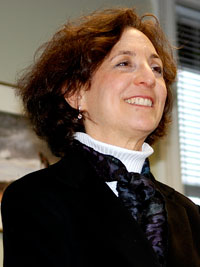Op-Ed: When Life Is Unfair
SED’s Bernice Lerner on what grads should know

In this season of endings and beginnings, accomplished individuals offer their wisdom to our nation’s graduates. They highlight unique attributes of this generation and the special challenges they face. They speak of matters of global concern. And at some institutions of higher education, an author, prize-winner, or statesman might awaken in young people the desire to serve, or to express their creativity, or to hone their senses of humility and awe.
I have not, however, heard a speech that focuses on this inevitability: life being unfair.
There is the ineffable injustice of being caught at the wrong place and time in history, such as a war or a natural disaster. There is the injustice of terrible events, such as having to deal with a debilitating illness or the loss of a loved one. And for those of us who are more blessed, there are less earth-shattering injustices, such as being covertly discriminated against, defrauded, or downsized out of a job. Such as having to deal with unreasonable demands on our time and energies or being denied what one is qualified for or entitled to. There is no limit to the docket of injustices that could be brought before cosmic small claims courts. And few among us, no matter how privileged or successful, escape some such instance in any decade of our lives.
Privileged to be studying and writing about lives, I know intimately how good, hardworking individuals, caring and altruistic people, and talented and consummate professionals have had, through no fault of their own, to surmount boulders dumped on their career paths or to face doors slammed shut. How they have been asked to do what their consciences would not allow.
How can those who deliver messages to graduates prepare them for this cold, cruel world? Perhaps by acknowledging that nature has already taken its course. Twenty-two or so years of life, both in and beyond school, offer plenty of opportunity for practice with unjust situations. An insensitive teacher dismisses a question; a classmate fails to do her part in a group project; a coach displays favoritism in managing the team; a friend betrays a confidence. To the extent that young people have learned to choose well from a range of responses to such situations, they have attained measures of a moral education. To the extent they have learned to anticipate and plan for the possibility of things gone awry, without being fearful, they display good judgment.
I envision a graduation speaker putting before young people historical or literary examples and exemplars, inspiring good judgment. Take the biblical Joseph, whose brilliance was evident not only in his predicting that famine would befall Egypt, but also in his proposing to Pharoah, and executing, a strategy to prevent it from having devastating effects. We need to conceive appropriate contingency plans. Though we cannot prepare for every situation, it is prudent to save, expand one’s network of friends, and have an updated résumé at the ready.
Beyond readying oneself, just responses to injustice may be outrage, acceptance, counting blessings (or “reframing”), or redoubling one’s efforts toward some hopefully achievable goal. A combination of responses may also be in order.
How to choose wisely from the range of options and their infinite permutations? By paying attention to what we feel and striving to display these feelings in the most excellent way, according to Aristotle. How can we locate this way? By realizing that it exists somewhere between two extremes: one of defect and one of excess. A person of fine character will neither underreact nor overreact, but will respond with decency to particular circumstances. He will know how he is temperamentally inclined to respond, and in trying to “get it right,” consciously lean toward the opposite tendency. He might ask what the most judicious person he knows would do in the same situation. And he will aim toward producing the least pernicious outcome.
When there is no time to reflect, we will respond to injustice in our usual way. This is why it is crucial for young people to develop good habits of heart and mind, i.e., to practice dealing constructively with the unfairness to which they are subjected. This may mean striving toward positive goals, directing attention to the disadvantaged or the needy, speaking out against discriminatory practices, or lobbying for a noble cause. Given their natural tendencies, given the situations in which they find themselves, young adults will thus be equipped to deal with the inevitable.
Comments & Discussion
Boston University moderates comments to facilitate an informed, substantive, civil conversation. Abusive, profane, self-promotional, misleading, incoherent or off-topic comments will be rejected. Moderators are staffed during regular business hours (EST) and can only accept comments written in English. Statistics or facts must include a citation or a link to the citation.